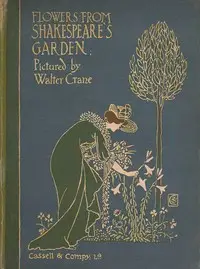"All's Well That Ends Well" by William Shakespeare is a play from the late 1500s to early 1600s that mixes funny and serious parts. The story is mostly about Helena, a smart young woman who wants to marry Bertram, a Count, even though they are from very different social classes. Themes of love, who we are, and how people connect are explored. The story starts by showing us Helena, sad about her father's death but also in love with Bertram. It shows that Helena comes from a good family but feels unsure because of her social class. Bertram doesn't want to marry her because of what people will think. The words they speak show us a deep look at love in royal courts and how hard it is for people to chase what they want when society has rules about class. Helena promises to heal the sick King of France, a choice that ties her fate to Bertram's, setting up a story of big goals and secrets with both comedy and drama.

All's Well That Ends Well
By William Shakespeare
Against the backdrop of social class, a determined young woman risks everything to win the heart of a reluctant count, embarking on a journey filled with healing, ambition, and unexpected twists.
Summary
About the AuthorWilliam Shakespeare was an English playwright, poet and actor. He is widely regarded as the greatest writer in the English language and the world's pre-eminent dramatist. He is often called England's national poet and the "Bard of Avon". His extant works, including collaborations, consist of some 39 plays, 154 sonnets, three long narrative poems and a few other verses, some of uncertain authorship. His plays have been translated into every major living language and are performed more often than those of any other playwright. Shakespeare remains arguably the most influential writer in the English language, and his works continue to be studied and reinterpreted.
William Shakespeare was an English playwright, poet and actor. He is widely regarded as the greatest writer in the English language and the world's pre-eminent dramatist. He is often called England's national poet and the "Bard of Avon". His extant works, including collaborations, consist of some 39 plays, 154 sonnets, three long narrative poems and a few other verses, some of uncertain authorship. His plays have been translated into every major living language and are performed more often than those of any other playwright. Shakespeare remains arguably the most influential writer in the English language, and his works continue to be studied and reinterpreted.








![The Works of William Shakespeare [Cambridge Edition] [Vol. 2 of 9] by William Shakespeare](https://cdn.a2-host.cloud/JQy5OgmCeFgcTocbEU_SGtmL1R3H3a-DnGU3eMAoHa8/rs:fill:215:325:0/g:ce/aHR0cHM6Ly9zcC1hc3NldHMuczMudXMtd2VzdC0wMDQuYmFja2JsYXplYjIuY29tL2Jvb2svNDUxMjgvVGhlX1dvcmtzX29mX1dpbGxpYW1fU2hha2VzcGVhcmVfQ2FtYnJpZGdlX0VkaXRpb25fVm9sXzJfb2ZfOV9jb3Zlci5qcGc.webp)


![The Works of William Shakespeare [Cambridge Edition] [Vol. 1 of 9]
Introduction and Publisher's Advertising by William Shakespeare](https://cdn.a2-host.cloud/w5FclnUtTNhgBouY0Lp7IqquYfjj_vBG8Sdud4CNG8c/rs:fill:215:325:0/g:ce/aHR0cHM6Ly9zcC1hc3NldHMuczMudXMtd2VzdC0wMDQuYmFja2JsYXplYjIuY29tL2Jvb2svMjMwNDEvVGhlX1dvcmtzX29mX1dpbGxpYW1fU2hha2VzcGVhcmVfQ2FtYnJpZGdlX0VkaXRpb25fVm9sXzFfb2ZfOV9JbnRyb2R1Y3Rpb25fYW5kX1B1Ymxpc2hlcnNfQWR2ZXJ0aXNpbmdfY292ZXIuanBn.webp)

